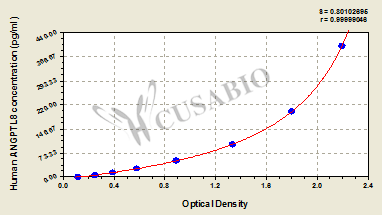Angiopoietin-like protein 8 (ANGPTL8) is a secreted protein that plays an important role in lipid metabolism and glucose homeostasis. Originally identified as a liver-enriched antimicrobial peptide, ANGPTL8 functions as a key regulator of triglyceride metabolism by modulating lipoprotein lipase activity. The protein is primarily expressed in liver and adipose tissue. Expression levels change based on nutritional status and metabolic conditions. ANGPTL8 has become an important biomarker in metabolic research, particularly in studies examining diabetes, obesity, and cardiovascular disease.
The Human angiopoietin-like protein 8 (ANGPTL8) ELISA Kit (CSB-EL028107HU) uses a quantitative sandwich measurement principle for detecting ANGPTL8 in human samples. This assay works with serum, plasma, and tissue homogenates with a detection range of 6.25 pg/mL to 400 pg/mL and sensitivity of 1.56 pg/mL. The protocol requires 50-100 μL sample volume and can be completed within 1-5 hours, with detection performed at 450 nm wavelength.
Application Examples
Note: The following application examples are drawn from a selection of publications citing this product. For additional applications, please refer to the full list of references in the "Citations" section.
This ELISA kit has been used in clinical research studies focused on metabolic disorders and diabetes research. The kit allows quantitative measurement of angiopoietin-like protein 8 levels in human serum samples from patients with various metabolic conditions, supporting biomarker analysis in diverse patient populations.
• Diabetes research: Applied in studies examining patients with type 2 diabetes mellitus, including newly diagnosed cases and those with ongoing antidiabetic treatment
• Metabolic profiling: Used for serum biomarker quantification in patients with obesity-related metabolic disorders
• Clinical biomarker studies: Applied in comparative analyses between patient groups and controls to measure circulating protein levels
• Specialized patient populations: Used in research involving patients undergoing chronic hemodialysis treatment




